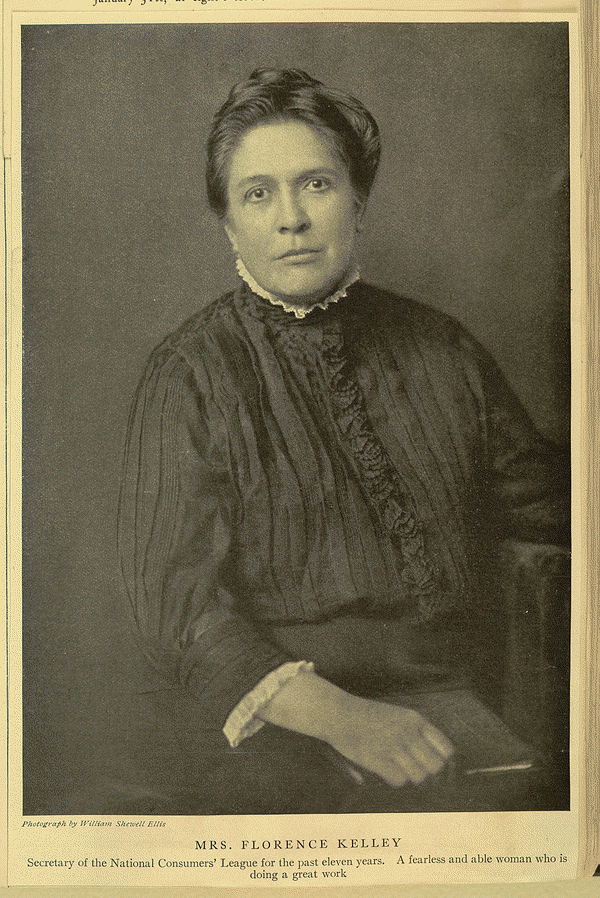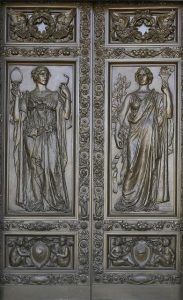I often say that I'm lucky that I study the reformers of the Progressive Era (roughly 1890-1917) because they obsessively documented everything they ever saw or heard or thought. As a result I'm awash in primary source materials, many of them in the public domain: magazine articles, autobiographies, organizational bulletins, and sociological studies of just about everyone and everything. I gather whatever I find of these, and I read much of what I collect. I digest these materials and cross-reference their ideological origins and the results and impact of their findings. Most recently, I'd been digging into Florence Kelley's writings when I came across a pretty striking essay where Kelley anticipates historian Richard Hofstadter's thesis about what made the era's reformers tick.[1]

In 1887, Kelley (sociologist, activist, settlement house worker, prolific author, and founding member of the National Consumers' League and the NAACP) published an article titled "The Need of Theoretical Preparation for Philanthropic Work," in which she breaks down the complicated practice of "philanthropy" ("love of mankind," literally translated) in an unequal society. Bourgeois philanthropy, she cautions, is really just a palliative measure, a "work of restitution for self-preservation," and its only consequential effect is to maintain the class system and the status quo. Working class philanthropy involves changing the system: lobbying for better working conditions and protections against exploitation of labor. The latter form goes beyond the token acts of charity Kelley saw many would-be philanthropists dabbling in, but it requires self-awareness and an understanding of the mechanics of power.
In the following paragraph, she urges those who wish to work for the public good to reassess their aims, actions, and prejudices:
"[When engaged in bourgeois philanthropy,] we give back a percentage of the booty, and find our advantage in prolonging the system that gives us all the rest. I do not for a moment lose sight of the noble self-sacrifice of men and women who in all disinterestedness give years of their life to philanthropic effort. Nor do I believe that all or most such work is done with the conscious intention of propping up a system of society which is based upon robbery of the working class. On the contrary, it is because I am convinced of the honorable and noble intention which animates a vast part of such work that it seems to me necessary for every thinking woman to pause before entering upon it and ask herself the question, What is the real nature of philanthropic work? And is the kind usually entered upon by the men and women of my class such as will satisfy my longing be of real use to my fellow men and women?"[2]
Now, this article really struck me. See, I also spend a lot of time reading about archives: specifically, the way their fundamental philosophy is employed to marginalize or amplify certain voices according to the demands of how power is structured in any given institution, or city, or region, or country. Archives are NOT neutral. Don't get it twisted: I love archives and archiving and I think it's all quite laudable in intention; that's why I have high expectations for the laudability of its practice. I'm a total sucker for dramatic declarations about the inherent nobility of the profession, like this humdinger from early archives theorist Sir Hilary Jenkinson:
[An archivist's] aim is to provide, without prejudice or after-thought, for all who honestly wish to know, the means of knowledge. Viewed in these aspects the good archivist is the most selfless devotee of truth the modern world produces.[3]

as depicted on bronze doors
at the Library of Congress, via LOC
What a bunch of feel-good nonsense, right? But, like Kelley told her 19th century reformers, I love it and I want to believe it and I want this for the archival profession as well as all of the people they serve who seek truth. The trouble is, as Our Lord and Savior Michel Foucault would point out, that truth and knowledge aren't neutral, either. They are shaped and determined by the ever-shifting priorities and demands of those who hold power, who are in turn shaped and directed by an illusive conception of what they consider truth. Unintentionally or not, by feigning disinterested neutrality, archivists advance an agenda that maintains the status quo of power relations in a society. This is where archives, Foucault, and Florence Kelley converge.
Howard Zinn pointed out how this idea applies to archives in particular in a 1970 speech to the Society for American Archivists (bolding mine, for emphasis):
[knowledge] reflects the bias of a particular social order; more accurately, it reflects the diverse biases of a diverse social order, but with one important qualification: that those with the most power and wealth in society will dominate the field of knowledge, so that it serves their interests. The scholar may swear to his neutrality on the job, but whether he be physicist, historian, or archivist, his work will tend [...] to maintain the existing social order by perpetuating its values, by legitimizing its priorities, by justifying its wars, perpetuating its prejudices, contributing to its xenophobia, and apologizing for its class order. Thus Aristotle, behind that enormous body of philosophical wisdom, justifies slavery, and Plato, underneath that dazzling set of dialogues, justifies obedience to the state, and Machiavelli, respected as one of the great intellectual figures of history, urges our concentration on means rather than ends.[4]
I hesitate to call archiving philanthropy, but it is certainly a public service. I also think it would be fair to attribute it to some degree of love for mankind. It's also (drawing on some in-class discussions) considered a profession, which indicates a course of training and an inculcated set of values. Given this existing framework, wouldn't it be a simple enough thing to urge archivists to think critically about their assumptions and methods? Isn't it a noble thing to strive to do better, to admit that a false aura of objectivity hurts more than it helps, to document multiple perspectives and serve a wider public? Can we move beyond token diversity initiatives and social history collecting areas to invest in a more equitable and open archival profession? Or are (white, middle-class) archivists too invested in "prolonging the system that gives us all the rest" of the power, the status, and the authority to define what is true?
Notes & Citations
- [1] Hofstadter's theory is called the status revolution, and it basically states that upper-middle-class people engaged in philanthropy as a way to pay lip service to issues of entrenched societal inequality while not actually solving its root causes.
- [2] Florence Kelley Wischnewetzky, "The Need of Theoretical Preparation for Philanthropic Work," The Christian Union, 35:22 (June 2, 1887)
- [3] Hilary Jenkinson, "British Archives and the War," American Archivist, 7:16 (Jan. 1944)
- [4] Howard Zinn, "Secrecy, Archives, and the Public Interest," Midwestern Archivist 2:2 (1977)
Further Reading
Michelle Caswell, "Seeing Yourself in History: Community Archives and the Fight Against Symbolic Annihilation." The Public Historian 36:4 (2014), 26-37. https://doi.org/10.1525/tph.2014.36.4.26
Burgis Jules, "Let the People Lead: Supporting Sustainability vs Dependency Models for Funding Community-Based Archives," On Archivy, https://medium.com/on-archivy/let-the-people-lead-supporting-sustainability-vs-dependency-models-for-funding-community-based-82f76d54c483
Mario H. Ramirez, "Being Assumed Not to Be: A Critique of Whiteness as an Archival Imperative," The American Archivist 78:12 (Fall/Winter 2015), 339- 356. https://doi.org/10.17723/0360-9081.78.2.339